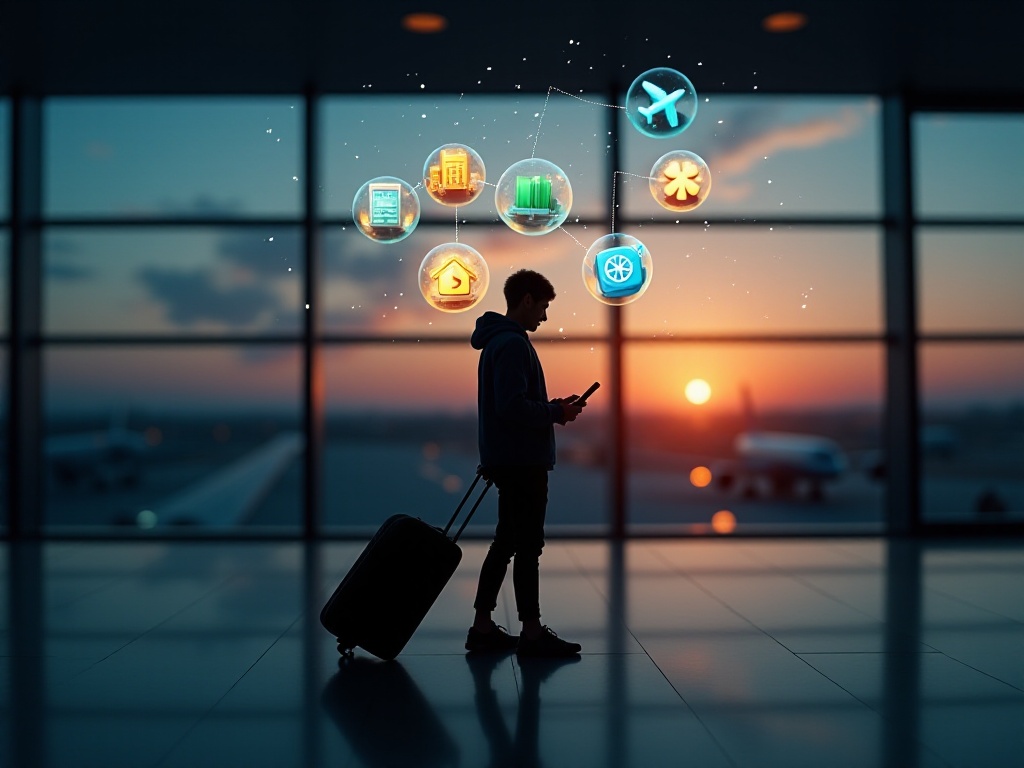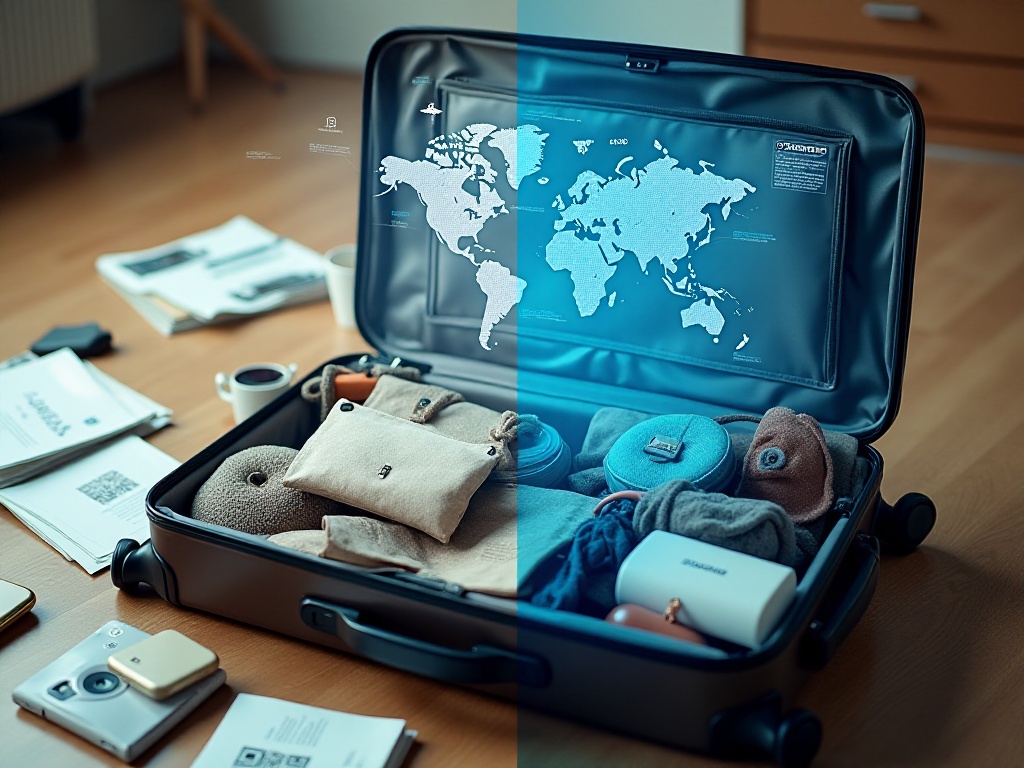Introduction
While preparing for a recent European trip, I discovered how a good travel app can significantly ease your journey. As a travel blogger who has explored many places over the years, I've compiled a list of travel apps I've personally tested, hoping to help you avoid unnecessary hassles when planning your trips.
Every app recommended in this article comes from my repeated use and in-depth experience. Honestly, there are too many travel-related apps in the market now, and finding the right ones can be overwhelming. I remember when I first started as a travel blogger, I was confused by various apps, downloading many that ended up being unused and just wasting phone storage.
Trip Planning
When it comes to trip planning, TripIt is an absolute game-changer. Its best feature is that it automatically generates a complete itinerary just by forwarding your flight, hotel, and car rental confirmation emails. This function is perfectly designed for frequent travelers like us.
My business trip to Tokyo last month further confirmed TripIt's practicality. During that tight schedule, from Narita Airport to the city hotel and various meeting locations, everything was managed through TripIt. What impressed me most was its offline functionality - I could check my schedule even in signal-dead zones like the subway, which is a lifesaver when navigating unfamiliar cities.
Moreover, TripIt automatically updates flight status, reminds you of boarding times, and even tells you how long it takes to walk from security to your gate. Once during a layover in Chicago, thanks to its real-time alerts, I knew about flight delays in advance and got recommendations for ways to pass time - such thoughtful details really make a difference.
If you're the type who likes to plan everything meticulously, Wanderlog is your essential tool. Last year, I used it to plan a Kyoto trip, mapping everything from morning visits to Kiyomizu Temple to evening strolls in Gion, including lunch spots. What attracts me most about this app is its visualization feature, which displays your route on a map, letting you instantly see if your planning makes sense.
I particularly love Wanderlog's collaboration feature. When planning a European trip with my best friend recently, we could both edit the same itinerary simultaneously, adding places we wanted to visit and adjusting the order. It automatically calculates distances and required time between attractions, reminding you to adjust if the schedule is too tight. This feature is absolutely invaluable for group travel.
Another noteworthy mention is Google My Maps, which, while not specifically a travel app, has unique advantages in trip planning. You can mark all places you want to visit, add notes, plan routes, and export your personalized travel map. I often use it to create a rough route for long trips before using other apps to detail daily itineraries.

Pre-Trip Preparation
When it comes to pre-trip preparation, I must highly recommend PackPoint. Its strongest feature is smart recommendations, automatically generating packing lists based on your destination, weather, and trip type. For instance, if I'm going to London for a 5-day business trip, it will remind me to pack suits and dress shoes based on weather forecasts and schedule, even including an umbrella considering London's rainy nature.
Honestly, before PackPoint, I had to make my own lists for every trip, always worried about forgetting something important. Now, I just input basic information into the app, and it thinks of everything. Better yet, it adjusts the list content based on your gender, exercise plans, and whether you'll need to do laundry. I remember when going skiing, it not only reminded me to bring thermal underwear but didn't forget small items like sunscreen that are easily overlooked.
For international internet access, I personally recommend OHAYU eSIM. Its biggest advantage is convenience - no more running to airports or convenience stores for physical SIM cards. Last time in Korea, I bought the eSIM package in advance through the app, and it was ready to use as soon as I landed, saving lots of trouble. It supports many countries and regions, has stable signals, and is cheaper than physical cards.
Additionally, OHAYU eSIM has a thoughtful feature that lets you set activation time in advance. For instance, you can set it to activate when you arrive at your destination, avoiding wasted data. It also supports multi-device sharing, so if you bring devices like tablets, one package can be shared among multiple devices, making it very cost-effective.
Regarding currency exchange, I now use Wise (formerly TransferWise). This app not only helps you exchange various currencies but offers particularly good rates. During my recent European trip, I used it to exchange euros, saving at least 2% compared to bank rates. Its virtual bank card feature is also useful for shopping on foreign websites without worrying about high cross-border fees.

Transportation
For transportation choices, Rome2Rio is my favorite. Its most impressive feature is its ability to plan optimal routes to anywhere. For example, if you're traveling from Paris to Amsterdam, it lists all transportation options including trains, buses, and rideshares, comparing prices, time, and comfort levels, allowing you to choose based on your specific needs.
During my European backpacking trip last year, Rome2Rio helped me save considerably. Once, traveling from Munich to Prague, it recommended a local long-distance bus that cost only one-third of the train fare. Though it took longer, being a night bus meant saving one night's accommodation. These hidden money-saving tips would be unknown without this app.
Rome2Rio also has a practical feature showing detailed information for each transportation mode. For trains, it shows specific departure times, arrival times, transfer points, and even locations of main facilities in stations. This is like having a personal guide for first-time visitors to unfamiliar cities.
For booking tickets, Hopper is definitely worth recommending. Its unique feature is price prediction, forecasting airline ticket price trends and telling you the best time to buy. Last year, I used it to book a New York to San Francisco flight, waiting for its lowest price alert and saved nearly 2000 yuan. Its alert system is particularly smart - if you set a target price, it immediately notifies you when tickets reach your desired price point.
Besides flights, Hopper now books hotels and car rentals. It analyzes historical data to tell you the best time to book hotels in specific cities. I find its price freeze feature most thoughtful - if you like a price but aren't ready to book, you can freeze it and still book at that price even if prices increase later.
For frequent train travelers, the Rail Planner app is very useful. Specifically designed for European rail systems, it can check train schedules across European countries and supports offline queries. Best of all, if you have a Eurail Pass, this app can help you book seats and check pass validity and usage.

Accommodation
Regarding accommodation, I particularly like using Airbnb. Its main feature is allowing you to stay in places with local character. Last year, I stayed in a century-old house in Kyoto that left a deep impression - complete with tatami mats, garden, and tea room. The host was a designer with great taste, and the whole house was artistically arranged. Just staying in such a place was enjoyable.
The key to using Airbnb is carefully reading reviews. I usually focus on host response time, cleanliness, and nearby amenities. Once in Barcelona, after reading a review mentioning "balcony facing Sagrada Familia," I booked that apartment without hesitation. It didn't disappoint - every morning I could see the Sagrada Familia gleaming in the sunlight when opening the curtains.
However, Airbnb has its limitations, such as less flexible check-in and check-out times than hotels, and some hosts may have limited English skills. So now I choose accommodation based on specific trip circumstances - hotels for business trips, Airbnb for leisure travel when wanting to experience local life.
For local experience activities, I strongly recommend trying Viator. This platform collects special experiences from around the world, from cooking classes to walking tours. In Paris, I booked an Eiffel Tower tour through it - the guide was a native Parisian who not only showed us every corner of the tower but shared many little-known historical stories, making the tour particularly interesting.
Viator's best feature is its reliable booking system, with most activities offering free cancellation. Once when I had to cancel a walking tour due to flight delays, customer service quickly processed my refund. Additionally, its app interface is user-friendly, showing specific times, prices, and itineraries for various activities, plus actual experience reviews and photos from other travelers.
For budget-conscious travelers, I recommend the Hostelworld booking platform. While primarily featuring hostels, it now also includes many boutique guesthouses. Recently in Portugal, I booked an excellent boutique hostel through it - not only was the environment good, but I met many friends from around the world. Its prices are usually cheaper than other booking platforms, perfect for backpackers on a budget.

Useful Tools
Speaking of useful tools, Google Lens is a must-mention marvel. Its most practical feature is real-time translation, especially in countries with language barriers. My experience in Tokyo is a perfect example - in a small restaurant with an all-Japanese menu, I just scanned the menu with my phone, and all dishes were automatically translated to Chinese, eliminating worries about ordering unwanted items.
Besides menu translation, Google Lens can identify buildings, plants, animals, and more. Once while walking in Rome, I saw a beautiful church, scanned it with Google Lens, and immediately learned it was St. Peter's Basilica, complete with historical information. It's like carrying a portable encyclopedia, making travel more educational.
For expense tracking, I can't do without Splitwise. It's most useful for group travel, making it easy to record and split expenses. Recently in Thailand with three friends, we recorded everything from flights and hotels to meal costs, and it automatically calculated how much each person owed, eliminating the hassle of manual calculations.
Splitwise also supports multi-currency accounting and different splitting ratios. For example, if someone has a single room, you can set them to pay more for accommodation. It can link directly with Alipay or WeChat for settlement, very convenient.
For those wanting to record travel memories, I recommend the Day One journal app. Its special feature is automatically recording your location information and weather conditions, plus storing photos and videos in your diary. I now use it to record every trip, and when looking back, all those details remain vivid and interesting.

Final Thoughts
After discussing so many apps, the most important thing is finding what works for you. Everyone has different travel habits - some like detailed planning, others prefer being more spontaneous. I suggest downloading these apps before departure and trying them to see which ones suit your usage habits.
I remember when I first started using these apps, it took time to figure them out. Some features might seem troublesome at first but become very handy once familiar. Like TripIt's automatic import feature - initially, I thought manual input was faster, but after several uses, I realized how much time automatic import saved.
The meaning of travel isn't just about seeing beautiful scenery, but experiencing all the little moments along the way. These apps can help us avoid many trivial hassles, letting us focus more on enjoying the journey itself. After all, tools should serve the experience, not overshadow it.
What travel apps do you use? Feel free to share your experiences in the comments. Everyone has their unique discoveries, and your insights might help other friends planning their travels.


